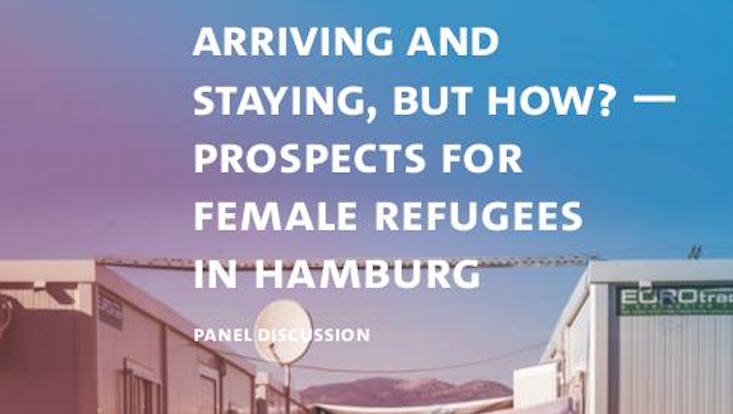RLC-Beraterin zur Situation von weiblichen Flüchtlingen in Hamburg
18 May 2017, by Internetredaktion

Photo: UHH
RLC-Beraterin und Gender-Beauftragte Nadine Kinne spricht auf einen Panel mit dem Titel: "Arriving and staying, but how? – Prospects for Female Refugees in Hamburg", gemeinsam mit Abir Abdulnour (syrische Soziologin mit Forschungsschwerpunkt Gewalt gegen Frauen; Sozialarbeiterin bei Dolle Deerns e.V.) und Julia Flor (Spezialistin für Psychiatrie und Psychotherapie, seit 2015 Mitglied von Haveno).
Zusätzlich gibt es kurze Inputs von lokalen Einrichtungen und Projekten: Amnesty for Women e.V. (Socialberatung), Intervention e.V. (Projekt für LGBT-Flüchtlinge), filia. die frauenstiftung (Sponsorship) und EmpowerVan by Dolle Deerns e.V. (mobile Beratung).
Das Panel dreht sich um frauenspezifische Zwangsmigration und Asylentscheidungen: Was zwingt Frauen zur Flucht? Was wollen und brauchen sie in Hamburg? Was müssen sie über das Asylsystem wissen? Ziel ist die Wissensweitergabe und Vernetzung von weiblichen Flüchtlingen, Initiativen und Forschenden. Die Journalistin Katrin Jäger moderiert.
More background information:
Refugee women who reach Hamburg often find themselves confronted with language barriers, stressful living conditions and little or no money. Whether on their own, with friends or with families they are often excluded from social activities and political decision making processes and have to recover from their traumatizing experiences.
It seems Hamburg's “Gate to the World“ has little to offer women fleeing from civil wars, crises and structural violence. Their prospects of leading the lives that they desire depend foremost on their legal status, their nationality and their personal circumstances. Often worrying about loved ones left behind, most women live in the smallest spaces amongst hundreds of other refugees. Only few succeed in Hamburg's housing or labour market.
However, especially since Hamburg's first Refugee Women's Conference in 2013 the voices of forcedly migrated women have become louder. More and more they protest at camps and share their experiences. Various initiatives, institutions, researchers and residents of Hamburg have shown interest in the needs and desires of women who were forced to leave their homes. With inside knowledge of those voices and efforts, activists and researchers will point out prospects for refugee women in Hamburg and tackle relevant questions.
The three events follow a discussion that took place in February 2016 called "Frauen auf der Flucht - Leerstellen in aktuellen Flüchtlingsdiskursen" and is organized by the Team of Equal Opportunities of the faculty of Economics and Social Sciences, University of Hamburg in cooperation with Zentrum GenderWissen.
All genders welcome!
